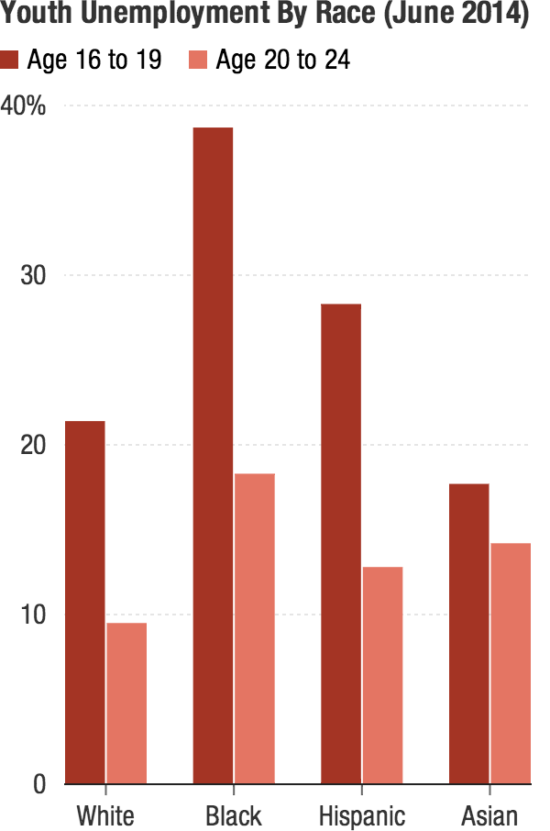It seems like the worst of the recent "Great Recession" is behind us. One sign is that the unemployment rate continues to drop. As our economy picks up, more jobs and opportunities are created. However, did you know that as the overall rate improves, African-American and Hispanic young adults continue to have a harder time getting hired? One in four blacks and 1 in six Hispanics under the age of 25 can't find a job.

| Source: | Bureau of Labor Statistics |
|---|---|
| Credit: | NPR |
| Notes: | BLS treats Hispanic origin as an ethnicity rather than as a race. There may be overlap between figures for white and Hispanic workers, and for black and Hispanic workers. |
This is what we found in NPR's Code Switch discussion titled, "The Youth Unemployment Crisis Hits African-Americans Hardest." Renee Montagne, the host, talks with William Spriggs, an economics professor at Howard University, about why this is the case. Despite the increase in overall employment and the general improvement of the economy, Spriggs explains that "We are not growing the economy at a fast enough rate to really address the backlog of all the people who are unemployed because of the great recession." In other words, the lower skill, minimum wage type jobs are being filled by people who are older, more experienced and perhaps over-qualified. "So young people have just been chased out of the labor market because we aren't generating enough jobs," said Spriggs.
Spriggs mentions that "We don't have a very good labor market information system. In most states, most firms do not publicly list all their job openings. And so you see disparities in job information between African Americans, Latinos and whites. And you often see this in the form of job-specific segregation."
Spriggs goes on to indicate the importance of finding a summer job and getting on professionally. We echo that. Each of the 11 grantee organizations for our summer Youth Employment grants has an educational, motivating and unique summer jobs program for at-risk youth in our city. Whether they provide jobs within the organization or connect them with outside employers, each young adult that benefits from these programs will end this summer with a wealth of new skills learned, a stronger resume, a positive attitude toward the working world and an eagerness to make their way in it. I'm excited for them and am grateful for a community that comes together to work to lower the unemployment rate and raise up new opportunities for young adults in Grand Rapids. Our community matters.
